
President Bush, flanked by Secretary of the Interior Dirk Kempthorne, left, and Secretary of Energy Samuel W. Bodman, called to end the federal ban on offshore oil drilling on Wednesday.
President Bush urged Congress on Wednesday to end a federal ban on offshore oil drilling and open a portion of the Arctic National Wildlife Refuge for oil exploration, asserting that those steps and others would lower gasoline prices and “strengthen our national security.
In recent years, the president said, “scientists have developed innovative techniques to reach Anwar’s oil with virtually no impact on the land or local wildlife,” referring to the wildlife refuge by its acronym. He continued, “I urge members of Congress to allow this remote region to bring enormous benefits to the American people.”
President Bush also urged Congress to approve the extraction of oil from shale on federal lands, something he said can be done far more economically now than a few years ago, and to speed the approval process for building new refineries.
Mr. Bush sought to take full political advantage of soaring fuel prices by portraying Republican lawmakers as imaginative and forward-looking and the Democratic majority in Congress as obstructionists on energy policy.
“I know the Democratic leaders have opposed some of these policies in the past,” Mr. Bush said. “Now that their opposition has helped drive gas prices to record levels, I ask them to reconsider their positions. If Congressional leaders leave for the Fourth of July recess without taking action, they will need to explain why $4-a-gallon gasoline is not enough incentive for them to act.”
The president’s move to end the ban on offshore drilling reverses his longstanding position on the issue. Together with the other proposals he laid out on Wednesday, it underscores how $4-a-gallon gas has become a major issue in the 2008 presidential campaign. A growing number of Republicans are lining up in opposition to the federal ban.
The party’s presumptive presidential nominee, Senator John McCain of Arizona, used a speech in Houston on Tuesday to say he now favors offshore drilling, an announcement that infuriated environmentalists who had long viewed him as an ally. Florida’s Republican governor, Charlie Crist, immediately joined Mr. McCain, saying that he, too, now wants an end to the ban.
Senator Harry Reid of Nevada, the Democratic majority leader, reacted quickly to the president’s remarks on Wednesday. “This week’s flip-flop on offshore oil drilling by President Bush and Senator John McCain is nothing more than a cynical campaign ploy that will do nothing to lower energy prices, and represents another big giveaway to oil companies already making billions in profits,” Mr. Reid said in a statement.
On Tuesday, before Mr. Bush’s decision became known, the drilling issue was already causing a heated back-and-forth on the campaign trail. Mr. McCain sought to straddle the divide between environmentalists and the energy industry, while facing accusations from his Democratic opponent, Senator Barack Obama, that he had capitulated to the oil industry.
Mr. Bush has said for years that he favors opening up the Arctic National Wildlife Refuge to drilling, and in 2006 he signed into law a bill that expanded exploration in the Gulf of Mexico. But the topic of coastal drilling elsewhere has been an extremely sensitive one in the Bush family; Mr. Bush’s father signed a presidential executive order in 1990 banning coastal oil exploration, and Mr. Bush’s brother Jeb was an outspoken opponent of offshore drilling when he was governor of Florida.
Now, though, President Bush is considering retracting his father’s order. Although the chief White House spokeswoman, Dana Perino, said Mr. Bush “is not taking any executive action” on Wednesday, two people outside the White House said such a move was under serious consideration, and a senior White House official did not dispute their account.
“This is a strong point of discussion inside the White House,” said Representative John E. Peterson, a Pennsylvania Republican who has been asking Mr. Bush for years to rescind his father’s action. Mr. Peterson is also leading an effort in Congress to repeal its ban.
Offshore drilling is blocked by two bans, one imposed by Congress and the other by the first President Bush’s executive order. Asked why the current President Bush did not act at once to lift the order imposed by his father, Keith Hennessey, the director of the president’s economic council, told White House reporters, “He thinks that probably the most productive way to work with this Congress is to try to do it in tandem.”
But the Institute for Energy Research, a nonprofit research organization that promotes “free-market energy and environmental policy,” has called for Mr. Bush to rescind the executive order and chided him on Wednesday for not doing so. “The president has chosen to speak softly when American consumers need him to wield a big stick,” the group’s president, Thomas J. Pyle, said in a statement on Wednesday. “This was a missed opportunity.”
Later, a White House spokesman, Tony Fratto, defended Mr. Bush’s refusal so far to lift the executive order. “The President turning his key alone isn’t going to do it,” Mr. Fratto said. “But he made perfectly clear that he will turn that key, that he will lift, or that he will announce the withdrawal if Congress can take action.”With oil selling for more than $130 a barrel in the commodity markets and no end in sight to high gasoline prices, Mr. Bush, a former oilman from Texas who came into office vowing to address an impending energy shortage, does not want to end his presidency in the midst of an energy crisis.
No one knows for certain how much oil is in the moratorium area. The federal Energy Information Administration estimates that roughly 75 billion barrels of oil in the United States may be found in all areas of the country that are now off limits for development, and that 21 percent of this oil — or about 16 billion barrels — is covered by the offshore moratorium.
Mr. Bush’s new stance on offshore drilling will inject him squarely into the presidential campaign, by putting the full weight of the White House behind Mr. McCain at a time when the candidate is trying to demonstrate presidential stature. But it will also expose Mr. McCain to accusations from Democrats that a McCain presidency would be akin to a Bush third term.
At the same time, the move will put the onus on Democrats, many of whom have long been staunchly opposed to offshore drilling. And it is likely to exacerbate the 30-year-old standoff in Washington over whether domestic drilling or conservation is the way to end American dependence on foreign oil.
That debate has grown especially acute in recent weeks, with the White House in “I told you so” mode. In a speech to the United States Chamber of Commerce last week, Vice President Dick Cheney said, “We should hear no more complaining” from opponents of domestic drilling, whom he called “part of the problem.”
Senator Reid responded by calling the vice president “Oil Man Cheney,” saying: “So all that Cheney can talk about, the Oil Man Cheney can talk about, is drilling, drilling, drilling. But there is not enough oil in America to make that the salvation to our problems.”
After hearing of Mr. Bush’s proposal on Tuesday night, Mr. Reid affirmed his opposition, saying, “The Energy Information Administration says that even if we open the coasts to oil drilling that won’t have a significant impact on prices.”
After President Bush’s remarks on Wednesday, Mr. Reid said: “The facts are clear. Oil companies have already had ample opportunity to increase supply, but they have sat on their hands. They aren’t even using more than half of the public lands they already have leased for drilling. And despite the huge tax breaks President Bush and Republican Congresses have given oil and gas companies to invest in refineries, domestic production has actually dropped.” And the House speaker, Nancy Pelosi, said, “The president’s proposal sounds like another page from the administration’s energy policy that was literally written by the oil industry: give away more public resources to the very same oil companies that are sitting on 68 million acres of federal lands they’ve already leased.”
The Congressional moratorium was first enacted in 1982, and has been renewed every year since. It prohibits oil and gas leasing on most of the outer continental shelf, 3 miles to 200 miles offshore. Since 1990, it has been supplemented by the first President Bush’s executive order, which directed the Interior Department until 2000 not to conduct offshore leasing or pre-leasing activity in areas covered by the legislative ban. In 1998, President Bill Clinton extended the offshore leasing prohibition until 2012. One person familiar with the deliberations inside the White House said that Mr. Bush was briefed on Tuesday by his top aides, including Joshua B. Bolten, the chief of staff, and that the aides recommended lifting the executive order.
On Capitol Hill, Republicans are proposing several bills to undo the ban. They differ on how close to shore drilling could begin, but all would give states a veto on oil exploration within 100 miles of their coastlines. Ms. Perino said Mr. Bush believed Congress should pass one of the bills, so the federal government and the states could work together to share revenues from exploration.
The issue does not fall entirely along party lines. One prominent Republican opponent of drilling, Gov. Arnold Schwarzenegger of California, does not intend to change his stance, a spokesman said Tuesday. In Houston, meanwhile, Mr. McCain, who has long been at odds with Mr. Bush on another environmental issue, climate change, tried to distance himself from the White House.
In a speech to oil industry executives and business and community leaders, the senator implicitly criticized Mr. Cheney, who in 2001 dismissed conservation as a “personal virtue.” Mr. McCain said the next president would have to break with the policies of the past, adding, “In the face of climate change and other serious challenges, energy conservation is no longer just a moral luxury or a personal virtue.”
On the issue of offshore drilling, Douglas Holtz-Eakin, Mr. McCain’s domestic policy adviser, said the senator had supported the moratorium until a compromise was reached in late 2006 between the federal government and Gulf Coast states that permitted oil and gas exploration in a vast area mostly 100 miles from shore.
“Prior to that, he favored the moratorium as a way to support states’ opposition to exploration,” Mr. Holtz-Eakin said.
But Mr. Obama, campaigning in Michigan, swiftly pointed out that Mr. McCain had supported the moratorium during his 2000 presidential run. “His decision to completely change his position and tell a group of Houston oil executives exactly what they wanted to hear today was the same Washington politics that has prevented us from achieving energy independence for decades,” Mr. Obama said in a statement.
The New York Times
http://www.nytimes.com/2008/06/19/washington/19drill.html?_r=1&hp&oref=slogin Una propuesta que podría provocar una baja en el precio del crudo
Una propuesta que podría provocar una baja en el precio del crudoEl presidente de Estados Unidos, George W. Bush, ha pedido este miércoles al Congreso derogar la prohibición de extraer petróleo de la plataforma continental del país en alta mar, vigente desde hace más de 25 años.
En esa franja existen 18.000 millones de barriles de petróleo, casi diez veces más que la producción anual del país y más que las reservas de Arabia Saudí, según Bush, quien señaló que la restricción “está anticuada y es contraproducente”. La zona estaría ubicada básicamente en las costas estadounidenses y en la Reserva Nacional Ártica de Vida Animal de Alaska.
La petición fue hecha un día después de que el candidato de su partido a la Presidencia, John McCain, propusiera lo mismo en un discurso en Houston, la capital petrolera del país.
Ambos han cambiado su postura al respecto ante la ansiedad de los estadounidenses por el precio de la gasolina, que ha superado el nivel psicológico de los cuatro dólares por galón (3,78 litros).
McCain defendió la prohibición en su campaña presidencial de 2000 (en la que perdió la candidatura republicana ante Bush), algo que el bando del demócrata Barack Obama se ha apresurado a recordar. Su nueva opinión le coloca en una posición extraña, pues McCain ha intentado presentarse como un candidato “verde”, un adalid contra el calentamiento global que ha criticado la pasividad de Bush en ese ámbito.
La restricción, que el Congreso impuso en 1982 por el impacto de las instalaciones en el medio ambiente, fue reafirmada en 1990 por una prohibición del Ejecutivo firmada por su padre, George H. W. Bush.
Bush también ha propuesto obtener petróleo de esquisto, una roca que produce el hidrocarburo al ser calentada. Estados Unidos cuenta con depósitos enormes en Colorado, Utah y Wyoming, que podrían generar 800.000 millones de barriles. Sin embargo, su extracción es mucho más cara que la explotación de yacimientos normales.
http://economia.noticias24.com/noticia/347








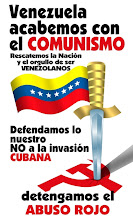






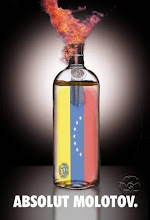
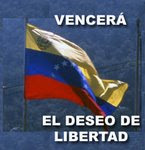





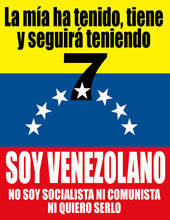
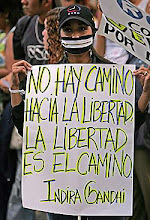






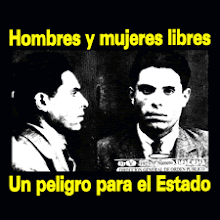











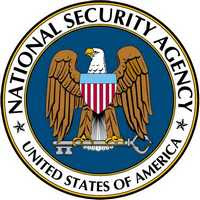


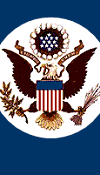










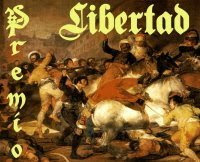



















No hay comentarios:
Publicar un comentario